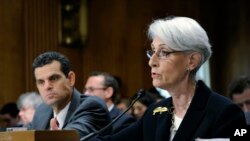Winning international cooperation is key to the U.S. efforts to sanction North Korea over Pyongyang’s latest nuclear posture, a former senior U.S. diplomat said.
Recently, Pyongyang took a series of provocative actions in defiance of international sanctions. Following a nuclear test last month, Pyongyang launched a long-range missile on Sunday, drawing widespread international condemnation.
Wendy Sherman, a former diplomat who most recently served as Under Secretary of State for Political Affairs, told VOA on Thursday Washington needs to “internationalize” its sanctions against Pyongyang.
International effort needed
“The U.S. alone cannot have all the impact that is necessary,” said Sherman, referring to a fresh sanctions bill that passed the Senate on Wednesday.
The Senate measure is aimed at curbing Pyongyang’s missile and nuclear development by targeting financial transactions supporting the effort. The House adopted its own North Korean sanctions legislation last month.
The diplomat stressed the importance of convincing Beijing to rein in Pyongyang.
“China, without a doubt, has the greatest leverage over North Korea, and China has been reluctant to use all of that leverage,” she said.
While Congress is trying to tighten U.S. sanctions against North Korea, the Obama administration is pushing for strong measures in the United Nations Security Council.
However, critics argue the international sanctions would do little damage to Pyongyang given the country’s limited engagement with the international community.
Sanctions impact unclear
Sherman said the U.N.’s “strong response” to Pyongyang’s aggression is necessary, adding whether it will change Pyongyang’s behavior remains unclear.
With Pyongyang’s nuclear threat growing, the Obama administration is facing criticism that its containment policy of “strategic patience” is blocking talks with Pyongyang.
Sherman refuted the criticism.
“Washington has always been willing to resume talks if the subject is denuclearization and North Korea comes to the table in seriousness,” said the former diplomat.
Unwillingness to talk
When asked if the U.S. should aim for a deal with North Korea that is similar to the recent nuclear agreement with Iran, Sherman was skeptical of the idea.
“This is entirely a different situation from Iran. The Iranian government made a decision to come to a negotiating table with seriousness and purpose. North Korea has not made a decision to come to a negotiating table," said Sherman, who dealt with both North Korean and Iranian nuclear issues intensively.
North Korea has been at odds with the international community over its nuclear development since the early 1990s. Multi-state talks involving the United States, China, Russia, Japan, and the two Koreas have remained stalled since late 2008.




